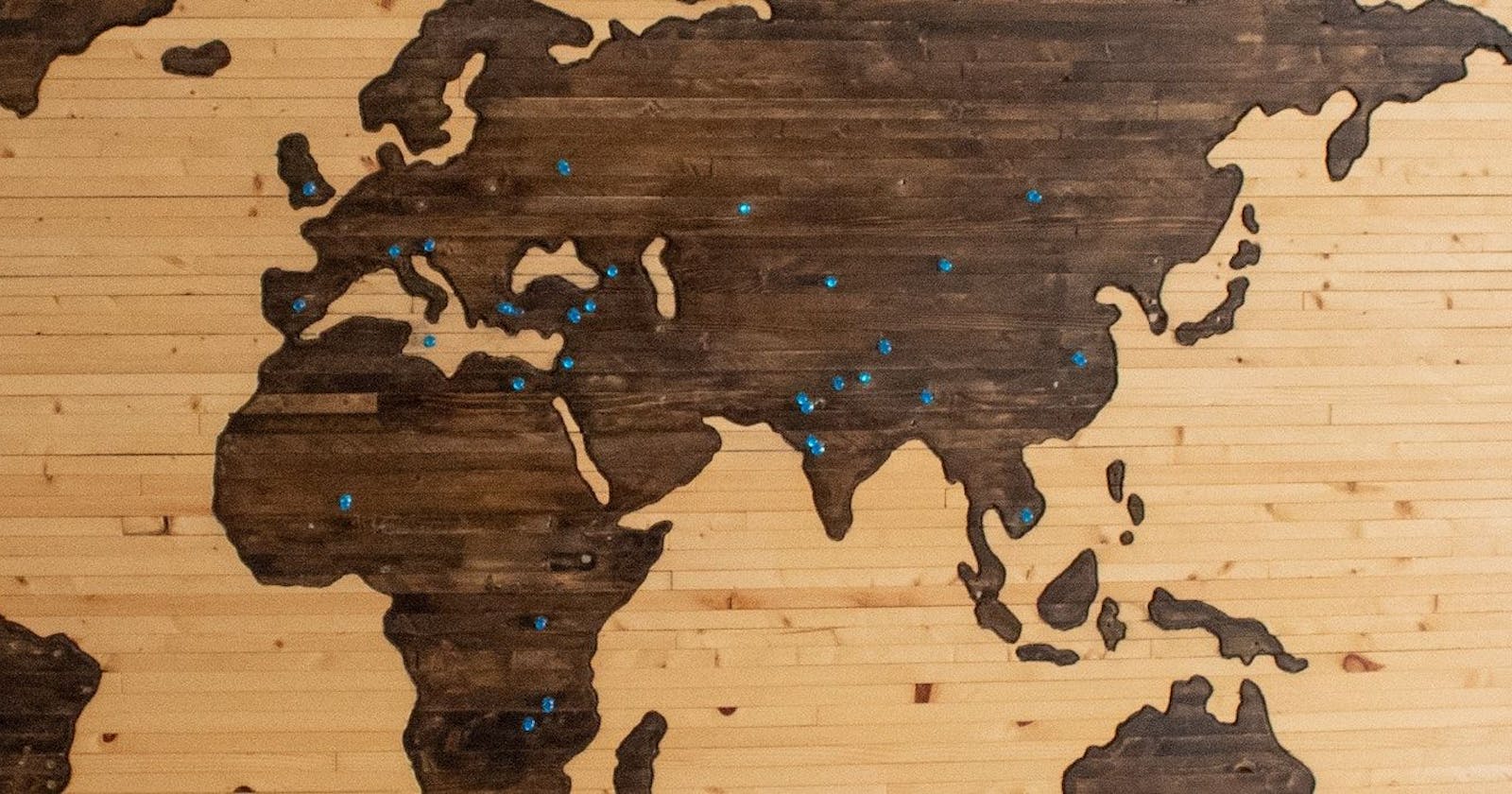Logistics of travel post-ish pandemic
Travelling around the world takes a lot of planning, but during and post a global pandemic it becomes a little more complicated.
Travelling around the world takes a lot of planning, but during and post a global pandemic it becomes a little more complicated. We have four months to go before we leave, and it is time to start booking some things up.
Audio Version
You can read the article below or listen to the audio version via my podcast or subscribe here.
During our trip, we are hoping to visit Antarctica, Argentina, Australia, Brazil, Canada, The UAE, Hawaii, Iceland, Ireland, Japan, Malaysia, The Maldives, New Zealand, Northern India, Peru, Singapore, South Korea, Sri Lanka, Taiwan, Thailand, USA and Vietnam.
Covid
During our planning we sway between "this will be amazing" to "we are going to be in a Travelodge outside Heathrow for a year, what the f* are we doing". Currently, most of the countries we plan to visit are on the UK foreign office travel restriction list; combining that with international leisure travel being banned presently in the UK, everything feels completely fine 🤷♂️🤪.
Though there is hope, at the current rate of the UK's vaccination program and the government's guidance that every adult in the UK will have had their first vaccination dose by July, we are playing the optimism card, as many countries are already outlining their international travel procedures for tourists such as requiring the vaccine or a negative PCR test upon arrival.
In our planning, we have outlined a route and where we want to visit but we are being realistic that it will change, and we have come to accept that some parts are going to go out of the window altogether.
We started to plan a backup plan and then backup backup plans such as visiting a reduced number of places or going into 2-week quarantines in a handful of countries and staying for longer. But after a month of working all this out, we have come to accept that we need to not stress about it and just plan our plan and expect it will change.
Visas
Luckily the majority of countries we want to visit have tourist visas on arrival for UK passport holders, these ranges from 15 to 180 days. There are only a few countries where we need to get a digital visa or extended visas before arrival. Currently, the USA and Vietnam are the only two countries we need to get visas for before we arrive, though Vietnam does require a embassy trip (Costing no more than £300 in total).
Immunisations
We need to get a lot of jabs before we travel, but more importantly we need to prove we have had them via medical travel documents. For example, if you travel to South America, you are advised to have the yellow fever vaccination but it is up to you. However, if you plan to visit the USA after you have been to South America you need to show proof you had the yellow fever vaccination before your South America travels. So country routing can be very important if you are going to be selective with vaccinations you take.
I was surprised by the cost and number of injections we will need, and it is likely to cost between £2-3k for the four of us. Of course, we could decide not to get some or all of the vaccinations but we are travelling with children so it is hard to take that route. During 2020 we have also been in semi-isolation in the UK due to covid resulting in our immune systems not fighting common illnesses for over a year so there is another reason to be more protected. I got my first cold this week in over a year.
Country Research
As currently we are uncertain which countries we can visit and when we can visit them we feel kinda stuck. However, we can at least build up a picture about the countries on our itinerary and use this exercise as some global geography educational for our children.
We created a document for each country with the below information that we would each research into:
🏨 Accommodation - what are our options for sleeping from hotels to tents, how busy are they during the time we plan to visit, are there any festivals/holidays that mean we need to book ahead of time. Are there friends or family we can stay with for some or all of our time in the country. What is our "pull the ripcord" hotel if we get ill or hate it all and need a night or two of comfort.
🍽 Meals - What is the average cost of meals from snacks for lunches to nice restaurant dinners, can you drink the water, what should/shouldn't you eat. What dishes do we need to try (national treasures) and known/recommended places to eat.
🦺 Safety - What is the government travel advice for the country we are going to visit as well as getting advice from online communities and friends on the ground about specific areas and possible places to avoid. Though travelling with children isn't going to take us that much off the beaten track.
🚆 Transportation - How we plan to get to the country, is the public transport system reliable, are there any discount travel cards specifically for tourists. Rules for taxis, are apps like Uber active in the country.
🏥 Medical - does our travel insurance have any exception for the country or any activities we plan on doing there (such as winter sports). Where are the main hospitals and which are the nearest to our locations that cater both adults and children. Rules of any limits for medicines you can take into the country (some places are very strict) and make sure we have the right medical forms if needed. What can you buy medicine over the counter, at a pharmacy and where are local doctors that speak English or regularly treat tourists and/or children.
🎡 Sights and sounds - are there any particular attractions or wonders we want to visit such as Taj Mahal in India or Sigiriya in Sri Lanka, along with how we get there, costs and best times to visit or avoid.
🛃 Local customs - understand the do's and don'ts of the country and common phrases too know in the local language such as where are the toilets and how much does that cost. Travel Insurance
Luckily the rise of digital nomads across the globe has created many options for travel insurance; of course, during covid it gets tricky. Thankfully most good policies cover what you would expect but you need to read the small print, for example if you get a one-year single trip world policy and fly back to the UK mid-trip, the rest of your policy gets cancelled (they don't tell you this), which is annoying if you need to come back for a very short time but plan to return on the trip.
A year of travel insurance isn't cheap; there are three methods to do this, one, don't have travel insurance though in covid times many countries require it. Second, is a single policy that covers you for the year, and the last is getting cover for each country as you go. The latter works out cheaper compared to the year long policy but adds a lot of admin time to trip "hassle". For our family of four, the cost of a one year single policy is between £100-£125 a month or about £4 a day. I will do a deeper dive post into travel insurance in a few weeks as it has been an interesting one to research in the current climate.
Booking Flights and Accommodation
Flights have been an interesting one and something we haven't been able to book beyond our first flight from the UK to Dubai. Because most countries (including the UAE) are on the UK don't travel list, you can't claim on your travel insurance if your flight is cancelled or the goverment says that you aren't able to travel due to the current pandemic. Some airlines, like Emirates, are offering flexible tickets so you can change your ticket date up to 2 years in the future from the date you book without any additonal charge though these tickets have a slight price increase built in anyway.
Hotels and services such as Airbnb are similar in that they are offering 100% refunds up to the day before check-in. To make the best case for this, if we intend to stay at a location for more than a few days when we arrive in the country we are booking a night somewhere else the day we arrive, so if there are an issue getting into the country, we can cancel our main accommodation and only lose that first single night refund wise, which we can then claim through insurance (hopefully 🤞). As countries open up, a concern is that hotels overprovision capacity due to cancellations, and we turn up to find no rooms at the inn but it will be warm and there are always places to stay 😀.
Being calculative can help a lot also, overnight flights are less busy and remove a crap night sleep near an airport without losing any days in a country which is a great if you are only there for a short period of time.
Tech in these times
Travelling in 2021 is much easier than ten years ago due to the globalisation of technology companies and mobile tech in general. Landing in many countries already means 4G data access, you can get taxis via Uber, places to stay via Hotels.com or food delivery via Deliveroo. These apps help with not getting ripped off by an unlicensed taxi driver at the airport or extra charges from a local hotel pushing their luck.
Money
Monzo is a great bank but you only get free overseas cash withdrawals up to £200 a month, though Starling bank has a 0% fee with no cap (Woohoo). We have also opted for a spare credit cards for emergencies.
Summary
This post has been the hardest to write so far, mainly due to the lack of solid decision we can make at this stage, though writing it has cemented the idea of being prepared but not being planned for this year of adventure.

